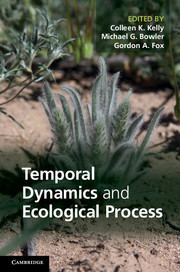
- Cited by 4
-
Cited byCrossref Citations
This Book has been cited by the following publications. This list is generated based on data provided by Crossref.
Bowler, Michael G. and Kelly, Colleen K. 2012. On the statistical mechanics of species abundance distributions. Theoretical Population Biology, Vol. 82, Issue. 2, p. 85.
Schwinning, Susanne Kelly, Colleen K. and Robinson, David 2013. Plant competition, temporal niches and implications for productivity and adaptability to climate change in water‐limited environments. Functional Ecology, Vol. 27, Issue. 4, p. 886.
Xiao, Zhishu Mi, Xiangcheng Holyoak, Marcel Xie, Wenhua Cao, Ke Yang, Xifu Huang, Xiaoqun and Krebs, Charles J. 2017. Seed–predator satiation and Janzen–Connell effects vary with spatial scales for seed-feeding insects. Annals of Botany, Vol. 119, Issue. 1, p. 109.
Helm, Barbara Visser, Marcel E. Schwartz, William Kronfeld-Schor, Noga Gerkema, Menno Piersma, Theunis and Bloch, Guy 2017. Two sides of a coin: ecological and chronobiological perspectives of timing in the wild. Philosophical Transactions of the Royal Society B: Biological Sciences, Vol. 372, Issue. 1734, p. 20160246.
- Publisher:
- Cambridge University Press
- Online publication date:
- December 2013
- Print publication year:
- 2014
- Online ISBN:
- 9781139048170
- Subjects:
- Plant Sciences, Life Sciences, Ecology and Conservation




